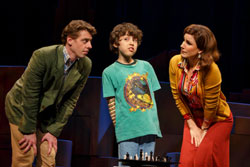A new production of William Finn and James Lapine’s Falsettos opened on Broadway on Oct. 27. The Lincoln Center Theatre production opened at the Walter Kerr Theatre and was directed by Lapine, the original director and co-book-writer. Finn also co-wrote the book and composed the mostly sung-through score.
Originally produced in 1992, Falsettos takes place in 1979 during act one and 1981 in act two. The revived production stars Christian Borle, two-time Tony Award winner, as Marvin, a neurotic gay man who divorced his wife, Trina (played by Broadway veteran Stephanie J. Block) and left his son, Jason (played by thirteen-year-old Anthony Rosenthal) to be with his boyfriend, Whizzer, played by Hamilton and Book of Mormon star Andrew Rannells.
The family drama only gets more complicated after Trina attends a session with Marvin’s psychiatrist, Mendel (played by An American in Paris’s Brandon Uranowitz); Mendel immediately becomes smitten with her and eventually proposes. Though none of the characters ever seem wholly at ease, they continue to make a life together in a hilarious, borderline neurotic way, even sharing meals together and taking each other’s advice on when to see a psychiatrist.
However, act one shows fractures in that cheerful, if confusing, ‘family’ – Borle’s Marvin is possessive and critical, often irked by Whizzer’s lack of enthusiasm for monogamy and his younger, boyish charm (perfectly played up by Rannells). Borle, typically known for comedic performances, such as his Tony-winning turns in “Something Rotten!” and “Peter and the Starcatcher,” plays a different character than he is used to. His Marvin is irritable, insecure, and filled with neuroses and adoration.
While act one is mainly the characters pointing fingers at each other, blaming themselves for the sources of their dissatisfaction – Trina and Whizzer think Marvin is too uptight and demanding; Marvin doesn’t see the problem – act two brings home the emotional heart of the musical.
Act two also introduces ‘the lesbians next door,’ Doctor Charlotte (played by RENT’s Tracie Thoms) and her girlfriend, ditzy but cheerful caterer Cordelia (played by Broadway starlet Betsy Wolfe). Taking place in 1981, it shows severe differences in the characters’ relationships from act one. Trina and Mendel are married; Marvin and Whizzer have broken up. Doctor Charlotte spends much of her time investigating a mysterious and never-named illness – the timing and the language used lets the audience fill in the blanks and realize that she is talking about HIV/AIDS.
Once this is stated, there’s an elephant in the room, and the audience is left waiting for the shoe to drop. The act continues on – Whizzer and Marvin get back together, and the family unit continues to shift and grows to contain Charlotte and Cordelia.
Eventually, Whizzer collapses, and everything seems to hit a standstill. The still-unnamed mysterious illness lands him in the hospital, and this marks the first set change of the production. Previously, the only set pieces used had resembled a child’s building blocks, large grey geometric chunks manipulated by the actors and placed against the background of a shifting Manhattan skyline. However, here, a hospital bed and screen come into place, and they do not leave until the final song of the musical.
It is here that Falsettos reaches its emotional high point. Rannells gets to show his range here as well – in “The Book of Mormon” and “Hamilton,” he played peppy, upbeat characters; Whizzer in the first act was also cute and shallow, dependent on his sense of style, good looks, and charm. However, here he introduces a touching sense of dignified resignation as Whizzer grows weaker, while managing to maintain Whizzer’s warmth and humor.
The second act also shows how the characters deal with the illness in their own ways – Marvin struggles as he watches his partner decline; Jason tries to push off his bar mitzvah until Whizzer “gets better,” only to finally be told by Mendel that a return to health is not possible. Charlotte puzzles over Whizzer’s slow decline; Trina does her best to keep her son and ex-husband afloat; Cordelia supplies treats and samples for the bar mitzvah; the three women work together to replicate normal life from a hospital room.
Eventually, the inevitable happens and the characters are left to decide how to get on with their lives, since their “small band” has now been cut down by one.
Antic and frantic throughout, the show was revolutionary for its original premiere in 1991. Now, twenty-five years later, its fundamental subject – love, as maddening and life-complicating and mysterious and uplifting as it is – has not changed, disappeared, or lost its power over the audience and the world at large.
The production is a brilliant piece, exhilarating, poignant, and loving all rolled up in one. It is a shame that it is only running for a short-term limited engagement. It will close on Broadway on Jan. 8, 2017, after running for about three and a half months.
image taken from TheWrap




